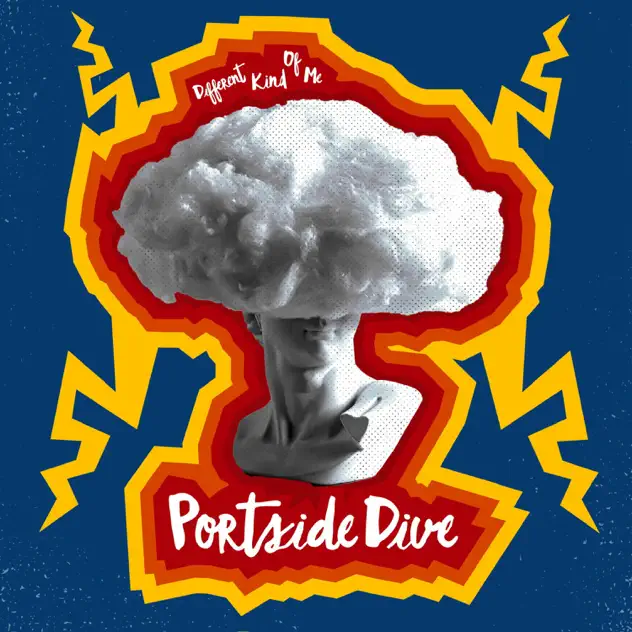Portside Dive comes to us with the sound of early 2000s punk in the same upbeat, yet brutally honest vein as Green Day, Weezer, or the All-American Rejects—Even boasting Mike Kennerty performing the song’s guitar solo. This song opens in a bright major key contrasted by an unsteady and discordant riff sounding out on regular occasions, throwing this perceived harmony into disarray. Before the band’s vocalist, Matt Reed even begins singing, we can hear the overarching theme of this song: Sometimes you’re masking quite a lot of unshakable pain, smiling as your mind whispers venom to you to the ignorance of those you surround yourself with. Yet, you may feel doomed to hear such torment eternally.
“Here I stand before you, half the man I used to be/Constant years of sorrow slowly eating me I don’t know what to do, I don’t know where to go from here”
Reed’s clear, brash voice encapsulates the exact sound the band uses for inspiration: A crunchy, enunciated tenor takes a nearly conversational tone to his singing in each verse to suddenly intensify during the chorus. The backing guitar and light drums support this first agonized plea kick up in intensity, dynamic, and (by virtue of the addition of the bass and piano) texture. Reed’s lyrics reveal a struggle with a common psychiatric symptom of depression: Negative self-talk. Negative self-talk describes the phenomenon of, to put it simply, a mind pessimistic of its owner; accomplishments are minimized to even an absurd degree in favor of instilling the feeling that the one experiencing this negative self-talk is inherently unworthy of what they strive to achieve. We see examples of such in later lyrics:
“My mind created such a giant web of lies/Like ‘you don’t matter,/what’s the point of even going on?'”
Of course, acknowledgment alone of a problem does not cure the root cause of problematic symptoms. In Cognitive Behavioral Therapy (CBT), for example, this negative self-talk is identified, then counteracted by identifying over-generalization (e.g. use of “always”, “never”, or “every”: “Every time I do this, this always happens, it never works out”), negative-favored filtering (e.g. “The waiter told me to enjoy my meal and I said ‘you too’? My entire day is now ruined”), taking things too personally (e.g. “I didn’t land that audition because I’m just not good enough for anyone”), binary thinking (e.g. “I couldn’t cheer up my friend today, so I must be a terrible friend to everyone”), dismissing pleasant experiences (e.g. “They only complimented me to make me feel better, they didn’t mean it”), misattributed responsibility (e.g. “I should’ve done more, I obviously didn’t do enough”, specifically said regarding something out of one’s control), emotion-based reasoning (e.g. “I think they’re just mad at me” becoming “They’re obviously mad at me”), and catastrophization (e.g. “If I can’t do this, it’s all over for me”), then challenging those cognitive trappings by examining the evidence before us, considering what other factors may play a part in our reasoning, and reframing these thoughts into more constructive ones (e.g. “I’m a disappointment for not getting a good grade on my exam” can become “I can improve my grade by studying more”, or “I think I’ll ask my professor if I
can retake this exam”). Reed’s lyrics provide a brief yet impactful example of how interpersonal relationships can help someone struggling with negative self-talk by offering an outside perspective, allowing one’s peers to naturally assist them in this cognitive reframing (granted, not at the same level as a professional therapist, yet still effective on an incidental level).
Halfway through the song, we’re treated to a tonal shift through a brief solo by pianist Zaq Baker, carried by the strummed chords of an acoustic guitar. The wobbling and uncertain riff haunting each verse prior suddenly dissipates as the tonal shift carries to Reed’s lyrics:
“But you told me I could be/a different kind of me/Wondered if I could ever be free from the depths of my own head/this existential dread/is killing me, I can’t escape”
Here, the piano features more prominently as the entire band lifts into a triumphant major sound. Matt Reed and hype chanter Kristen Reed become desperate in their cries of a reassuring bridge, and though the lyrics become nonspecific, Reeds’ words strategically sink a few inches deep yet many miles wide:
“You’ve got this chance/It’s your one shot/(Show the world that you are good enough)”
In an effort to combat a symptom all too common in those of us who feel it inescapable, Portside Dive crafts a critically catchy tune to ensure their listeners have, if nothing else, a generalized challenge to meet each instance of negative self-talk with as a reflex. I would say the group as a whole has succeeded in their creation of an anthem for cognitive reframing, and I gladly look forward to more of their raw emotional works being submitted to us in the future.
Written by Alexei Lee



